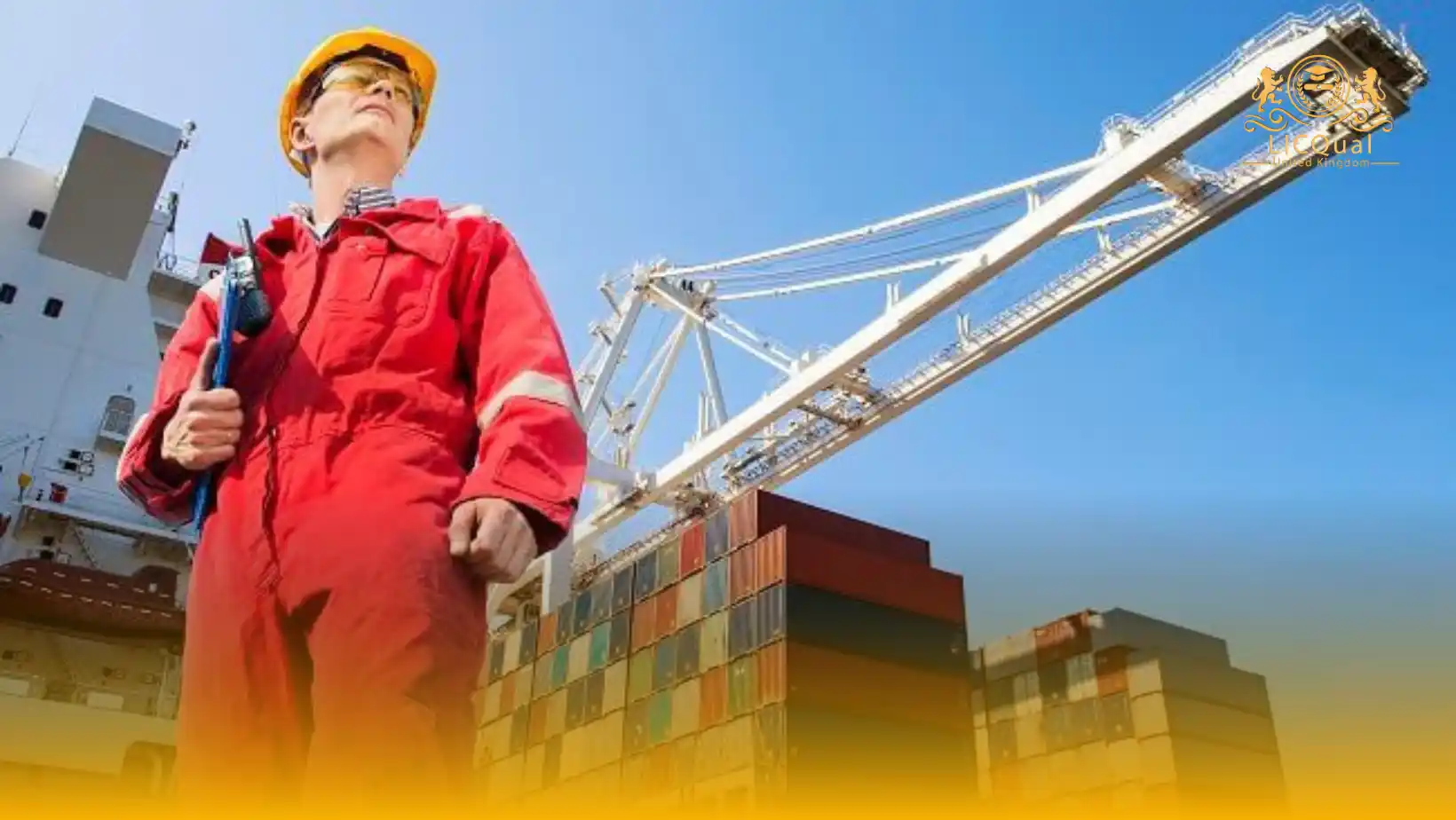The LICQual UK Level 3 Diploma in Ship Superintendency is a UK-accredited qualification designed for individuals who want to begin or strengthen their careers in ship management and maritime supervision. This internationally recognized diploma provides learners with the essential knowledge and practical skills needed to support ship operations, maintenance, safety, and compliance. It is the perfect entry point for those aspiring to become ship superintendents or to progress into technical and operational roles within the global shipping industry.
This Level 3 Ship Superintendency Diploma UK introduces learners to the fundamentals of ship operations, crew welfare, and international maritime regulations. Students will gain a clear understanding of the superintendent’s role in ensuring vessel safety, coordinating maintenance schedules, and managing compliance with international conventions such as SOLAS, ISM Code, and the Maritime Labour Convention (MLC 2006). By combining theoretical study with practical applications, the program ensures graduates are prepared for the real-world challenges of ship superintendency.
Employers across the shipping and logistics sector value the UK-accredited Ship Superintendency Diploma because it demonstrates competence in technical supervision, safety management, and crew coordination. Learners will also develop transferable skills in communication, reporting, and problem-solving—skills that are vital for effective shipboard and shore-based operations.
The Diploma in Ship Superintendency UK is suitable for seafarers, maritime professionals, and newcomers who want to build a strong foundation in ship management. With a focus on employability and career progression, this qualification opens doors to opportunities in ship management companies, port operations, and international shipping organizations.
Course Overview
Qualification Title
LICQual UK Level 3 Diploma in Ship Superintendency
Total Units
6
Total Credits
60
GLH
240
Qualification #
LICQ2201303
Qualification Specification
To enroll in the LICQual UK Level 3 Diploma in Ship Superintendency, applicants must meet the following criteria:
|
Qualification# |
Unit Title |
Credits |
GLH |
|---|---|---|---|
|
LICQ2201303-1 |
Introduction to Ship Superintendency |
10 |
40 |
|
LICQ2201303-2 |
Ship Operations and Maintenance Basics |
10 |
40 |
|
LICQ2201303-3 |
Maritime Safety and Compliance |
10 |
40 |
|
LICQ2201303-4 |
Crew Management and Welfare |
10 |
40 |
|
LICQ2201303-5 |
Ship Documentation and Reporting |
10 |
40 |
|
LICQ2201303-6 |
Professional Development in Ship Superintendency |
10 |
40 |
By the end of this course, learners will be able to:
1. Introduction to Ship Superintendency
By the end of this unit, learners will be able to:
- Explain the role and responsibilities of a ship superintendent in global shipping.
- Identify the key functions of ship superintendency in operations and compliance.
- Demonstrate knowledge of international maritime organizations and conventions.
- Recognize the importance of ship superintendents in ensuring vessel safety and efficiency.
- Apply foundational concepts of ship management to real-world maritime scenarios.
- Describe career pathways and progression opportunities in ship superintendency.
2. Ship Operations and Maintenance Basics
By the end of this unit, learners will be able to:
- Demonstrate understanding of ship operations, voyage planning, and port activities.
- Explain the fundamentals of ship maintenance, dry-docking, and repair planning.
- Apply basic principles of asset management to ship operations.
- Recognize the importance of preventive maintenance for vessel safety and performance.
- Identify the superintendent’s role in coordinating technical operations.
- Recommend improvements to enhance operational efficiency and cost-effectiveness.
3. Maritime Safety and Compliance
By the end of this unit, learners will be able to:
- Demonstrate knowledge of international safety conventions (SOLAS, ISM Code).
- Apply compliance requirements to ship operations and superintendent duties.
- Conduct basic risk assessments to ensure safe shipboard environments.
- Recognize the importance of safety culture in maritime operations.
- Explain the superintendent’s role in audits, inspections, and compliance reporting.
- Recommend strategies to improve safety and reduce operational risks.
4. Crew Management and Welfare
By the end of this unit, learners will be able to:
- Explain the superintendent’s role in crew welfare and human resource management.
- Demonstrate knowledge of the Maritime Labour Convention (MLC 2006).
- Apply basic principles of crew scheduling, rotation, and resource allocation.
- Recognize the importance of multicultural teamwork and communication onboard.
- Recommend strategies to improve crew welfare, motivation, and retention.
- Support compliance with international labour and welfare standards.
5. Ship Documentation and Reporting
By the end of this unit, learners will be able to:
- Demonstrate knowledge of essential ship documentation and reporting requirements.
- Apply record-keeping practices in line with international maritime standards.
- Recognize the importance of accurate documentation for audits and inspections.
- Prepare basic technical and compliance reports for ship operations.
- Explain the role of documentation in safety, maintenance, and crew management.
- Recommend improvements to streamline reporting and compliance processes.
6. Professional Development in Ship Superintendency
By the end of this unit, learners will be able to:
- Demonstrate professional skills required for career growth in ship superintendency.
- Apply problem-solving and decision-making skills to maritime challenges.
- Develop personal development plans aligned with international maritime standards.
- Recognize the importance of ethics and professionalism in ship management.
- Apply transferable skills such as leadership, communication, and adaptability.
- Prepare for progression to higher-level maritime qualifications, including Level 6.
The LICQual UK Level 3 Diploma in Ship Superintendency is designed for individuals who want to start or strengthen their careers in ship management and maritime supervision. This UK-accredited diploma is ideal for beginners, seafarers, and professionals seeking to formalize their skills in ship operations, safety, and compliance. Whether you are aiming to work in ship maintenance, crew welfare, or technical supervision, this qualification provides the foundation to succeed in global shipping.
1. Aspiring Ship Superintendents
- Individuals seeking entry-level roles in ship superintendency and management.
- Learners who want a UK-accredited qualification to start their maritime career.
- Students aiming to understand the fundamentals of ship operations and compliance.
- Candidates preparing for technical and operational roles in shipping companies.
- Beginners looking for a globally recognized maritime qualification.
2. Seafarers and Crew Members
- Current seafarers who want to transition into shore-based superintendent roles.
- Crew members aiming to progress into supervisory or management positions.
- Individuals seeking structured training in ship operations and maintenance.
- Workers looking to align with international maritime labour standards.
- Professionals preparing for higher-level maritime qualifications.
3. Maritime Safety and Compliance Staff
- Safety officers responsible for implementing international safety standards.
- Professionals aiming to specialize in compliance with ISM Code and SOLAS.
- Individuals preparing for roles in shipboard risk assessment and safety audits.
- Candidates seeking to promote a strong safety culture onboard.
- Workers committed to improving compliance and operational safety.
4. Technical and Maintenance Personnel
- Professionals involved in ship maintenance, dry-docking, and repair planning.
- Individuals aiming to strengthen knowledge of technical ship operations.
- Candidates preparing for roles in asset management and vessel upkeep.
- Workers seeking to improve efficiency in ship maintenance planning.
- Staff looking to formalize technical knowledge with a UK-accredited diploma.
5. Crew Welfare and HR Assistants
- Professionals supporting crew welfare and human resource functions.
- Individuals aiming to understand the Maritime Labour Convention (MLC 2006).
- Candidates preparing for roles in crew scheduling and welfare management.
- Workers seeking to improve retention and motivation strategies.
- Staff looking to align HR practices with international maritime standards.
6. Shipping and Logistics Industry Workers
- Employees in shipping companies seeking to expand into ship superintendency.
- Professionals aiming to understand shipboard logistics and compliance.
- Individuals preparing for roles in maritime HR and operations.
- Workers looking to strengthen knowledge of international regulations.
- Candidates targeting career progression in shipping and logistics.
7. International Learners and Global Workforce
- Students worldwide seeking a UK-accredited ship superintendency diploma.
- Learners aiming for international career opportunities in shipping.
- Professionals looking for a qualification recognized across global markets.
- Candidates preparing for maritime roles in Europe, Asia, or the Middle East.
- Workers seeking compliance-focused training for global shipping operations.
Assessment and Verification
All units within this qualification are subject to internal assessment by the approved centre and external verification by LICQual. The qualification follows a criterion-referenced assessment approach, ensuring that learners meet all specified learning outcomes.
To achieve a ‘Pass’ in any unit, learners must provide valid, sufficient, and authentic evidence demonstrating their attainment of all learning outcomes and compliance with the prescribed assessment criteria. The Assessor is responsible for evaluating the evidence and determining whether the learner has successfully met the required standards.
Assessors must maintain a clear and comprehensive audit trail, documenting the basis for their assessment decisions to ensure transparency, consistency, and compliance with quality assurance requirements.







